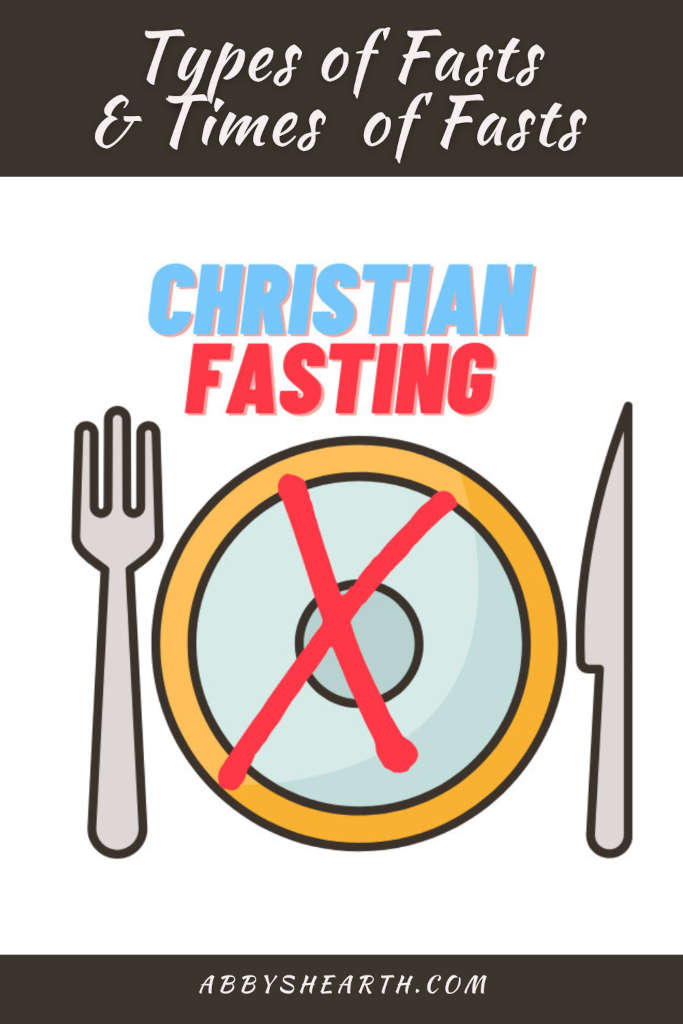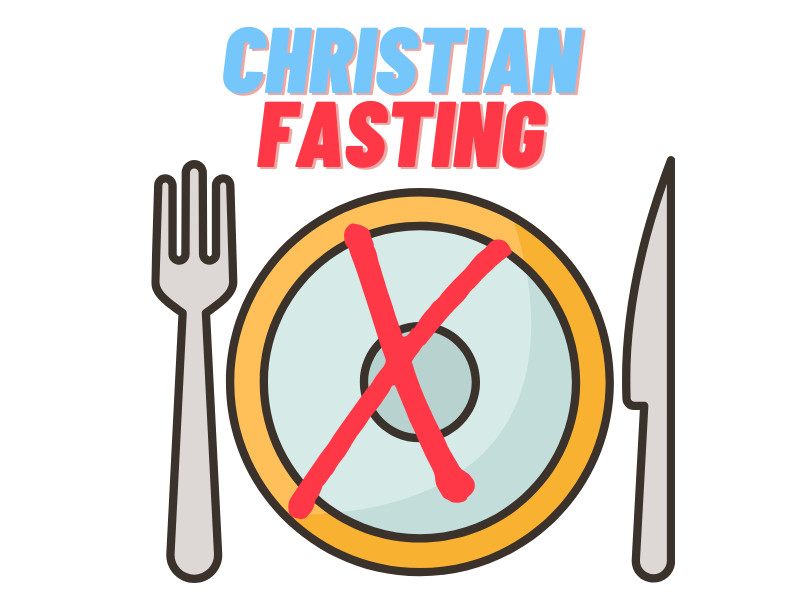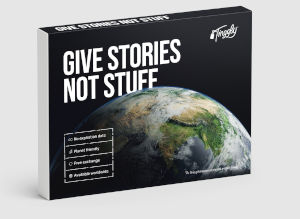Fasting as a Christian doesn’t have to be hard to do. While starting out with fasting may feel like a daunting task, the right mindset and options can be a game-changer.
Don’t think of what you’re giving up while fasting; think about what you’re gaining. Denying the flesh has more gains in the spiritual realm than in the physical.
It’s also important to know the type of fast Abba wants you to undertake and not just pick up any random fast. Before you go on a fast, try to spend some time listening to the Holy Spirit so you fast the right way, be it materially or spiritually.
Why is fasting important to a Christian?
This question can be answered as a whole, but it’s important to dig deep and answer for yourself as well.
Fasting is a way to allow yourself to deepen your faith and your relationship with God. It’s one way of denying our flesh as Jesus asked us to do (Mark 8:34, Matthew 16:24, Luke 9:23, Galatians 5:24, Romans 6:6).
It’s a way to peel back the layers of who you think you are, to find out who you want to be, and more importantly, who Abba wants you to be.
Why Should I Fast?
If you’re asking yourself this question, you’re not alone. Many people feel the need to fast, but not everyone knows why.
And sometimes, you may not have a definitive answer. Fasting is similar and different for each person.
Some people say, ‘If you want to fast, fast’. But you don’t just fast on a whim. You fast because you want to change your life, ways, and your behavior. You fast because you want answers. You fast because you want to grow closer to Jesus. Really, going to an amazing church is not the only way to maintain a relationship with Jesus.
You fast because Abba instituted the fast as a means of humbling oneself and atonement. You fast because Jesus didn’t say ‘if you fast’, he said ‘when you fast’ because he assumed fasting is an everyday part of your life. (Matthew 6:16-17)
Fasting is a physical action, but it’s one that results in more spiritual growth than you realize. It’s realigning your priorities to match heaven’s will for your life.
It’s telling your flesh that it’s just temporal and that your eternal Spirit holds more weight. It’s saying to Abba, that you value Him more than the pleasures of this life and that you’re willing to give up anything and everything you must to grow in intimacy with Jesus.
Be committed to your process and fasting, and allow your faith and connection to Jesus and the Holy Spirit to grow.
What should you not do while fasting?
While many people know what fasting entails, it’s not always as clear how to fast as a Christian.
Knowing how to fast as a Christian is just as important as choosing to fast itself. It’s also important to know what not to do when fasting as a Christian.
If you’re a new Christian or even an old one who’s taking the leap to start fasting, make sure that you’re not doing anything that could jeopardize your health. Traditionally, Senior Citizens, children, and people with illnesses are exempt from fasting. If you fall in any of these categories, check with your pastor and doctor before fasting.
Don’t be afraid to fast, but maybe it’s better if you start with the smaller fasts first, unless of course, you’re really in need of answers or help from heaven. Everyday fasting doesn’t have to be drastic, and the simple examples below are proof of that.
Here are some of the types of Christian fasting to choose from.
The Different Types Of Fasts Christians Can Undertake
Here are some of the main types of fasting as a Christian. Study them and choose the best one for you.
1. Liquid Fast
This fast is one that many people do, but this doesn’t mean that you only drink water. You can drink vegetable or fruit smoothies, but usually not drinks such as tea or coffee or alcohol. Well, it depends really. You set the boundaries of your fast, so you decide which liquids you want to include or exclude. You can have tea or coffee if you want to, but alcohol is an absolute no!
Staying hydrated with water is important, but you can make sure that you’re getting proper nutrition from the fruit juices or veggie juices.
Liquid fasting is great for cutting out all the excess in your life and allowing yourself to focus on yourself and God. (Plus, it’s also a type of detox usually recommended by dieticians.)
2. Water Fast
A more targeted type of liquid fast, the water fast allows you to only consume water for the duration of the fast.
Many Christians turn to this fast in times of need or in times when desperately looking for answers.
A water fast is stricter and sometimes difficult. But starting with just a day or two is a great way to test your limitations.
As you get used to fasting more often, you’ll often forget that you’ve not had anything to eat or drink for hours, or days.
3. Dry fasting or absolute Fasting
The dry fast or absolute fast is the type of fast God instituted for the Jewish people in the Third Book of Moses in the Tanakh (Leviticus 23:26-32). It marks the holiest day in Judaism, the Day of Atonement or Yom Kippur.
Dry fasting is when you abstain from everything including food and drink for a specified period. Work is also to be avoided while fasting, and our time should be spent communing with Abba, repenting, reflecting, and redirecting our lives.
Absolute fasting can be done for a few hours a day, 8 hours, 12 hours, 24 hours, 2 days, or 3 days. But generally, dry-fasting for more than 3 days is not recommended unless Abba specifically asks you to do it.
4. Daniel Fast
We’re all too familiar with this fast, right? This is where you cut out meat, sugars, and all alcohol and focus more on whole foods like vegetables, nuts, and fruits.
This fast is actually from the times Daniel fasted in the Bible (Daniel 1:2, Daniel 10:3), so it’s a common fast for Christians to partake in.
5. Social Media Fast
Did you know that you can fast without cutting out food or drink? Taking a social media break can be a great way to cut out the excess and negative things in your life and focus on what’s really important.
Is your favorite Youtube or Tiktok icon really worth watching every day? Do you really need to Tweet ten times a day? How many pins do you really need to pin today? Can you live without watching a few episode of Grey’s Anatomy or Manifest or Good Wife or White Collar? What are these really adding to your life?
The easiest way to go on a social media fast, is instead of spending time online scrolling, pick up your Bible and read it instead. Join a local Bible study group, or simply listen to worship music. Read a Christian book of value or write a diary thanking God for everything He’s doing in your life. Replacing online activity with spiritual and faith activity is a great way to grow closer to God.
6. Activity Fast
This is somewhat like the social media fast but a tad different.
What’s your favorite thing to do? Reading, hiking, soccer, dancing, window-shopping? Drinking coffee? Eating donuts? Decide that you’ll give up this for a day, or a few days a week, or a week or a month.
You don’t have to give up your favorite food or any of these activities permanently. Just set aside the time you would have spent doing this to grow in your relationship with God. Even if it’s for a short while, it will please Abba.
7. Abstinence as a Fast
In a world where carnal pleasures abound and beds are jumped in randomly, abstaining from sex before marriage is another form of fasting. Purity and consecration are a choice that young men and women can make.
No getting too initmate before marriage. No dating just for company. No watching that stuff you shouldn’t. Consecrate your life to the Father till He gives you the spouse He’s anointed you for. As one of my favorite Pastors said, ‘We consecrate ourselves, He sanctifies us’.
Does the Bible instruct us to fast?
Not in so many words. There are many different instances where fasting is referenced or talked about, and that is where Christians draw their inspiration from.
In Leviticus 16 and Numbers 29, God asks the Jewish people to humble themselves. Later on in Psalm 35:13, King David said he ‘humbled my soul with fasting’.
In 2 Samuel 1:12, the people fasted when King Saul and Jonathan were killed in battle. In Jonah 3:5, the people of Nineveh fasted in repentance.
In 1 Samuel 1:7-8, Hannah fasted because she wanted a child. In Esther 4:16, Queen Esther fasted to save the lives of her people. In Nehemiah 1:4, he fasted in mourning for Jerusalem.
Remember, Jesus didn’t say ‘if you fast’, but ‘when you fast’. In Matthew 6:16, he expected his disciples and followers were already in a lifestyle of fasting. Jesus fasted 40 days before being tempted in the desert.
How long should I fast?
There is no direct length of time to fast. Some can be for hours or days, some for longer, it all just depends on what you want to accomplish and how long you hope to stick with your fasting plan. Here are some traditional fasting options.
1. Few hours a day
Many of my friends simply skip a meal, either breakfast or dinner. It’s usually easier to follow this simple regular fast.
You can do it once or twice a week or more often depending on what answers you’re looking for from Abba.
2. The 9 to 3 Fast
Fasting from 9 am to 3 pm is popular among many Christians because in Mark 15:25 the crucifixion takes place at the third hour (9 a.m.) and Jesus’ death at the ninth hour (3 p.m.). Fasting at these hours is usually as a sign of gratitude to our Heavenly Father for sending Jesus to take our place on that cross.
Many of us prefer to fast on Tuesdays and Fridays because it’s the two days in the Bible that God said that ‘it was good’. Not really theological, because Abba rewards us any time we fast. (Although, more often the rewards are spiritual rather than material.)
3. 24 hours
Apart from fasting on the Day of Atonement, you can pick any day of the week to fast from food (and water) for 24 hours. You can choose to do this every week or every month.
4. 3 days
Whatever fast you pick, you can do it for 3 continuous days. So with skip breakfast or dinner for 3 days, or don’t touch the television for 3 days. Or skip food from 9 am to 3 pm for 3 days. Or go veg, or cut sugars, or give up coffee. Whatever you do, do it for 3 days.
Or, you can also extend the 24-hour fast to 3 days if you have the spiritual stamina. This sort of 3-day dry-fast is called the Esther Fast.
5. Fasting for 7 days / 10 Days / 21 Days or 40 Days
The same stuff you do for the 3-day fast. Skip something, give up something, do something else. Just do it for 10 days, 21 days, or 40 days.
Is Fasting For Me?
Has God called everyone to fast? Yes. What type of fast has He called us to? It’s different for everyone. Should you fast? That’s really only a question you and the Holy Spirit can decide together.
Fasting can be a sign of penitence, thankfulness, and showing God that you choose Him above the things of this world. Fasting can also be instrumental in finding out who you are, and redirecting your life to bring it in alignment with Abba’s will for you.
As you can see, there are many ways that you can fast as a Christian, without stressing yourself out or feeling like it will take a long time to prep and prepare.
Think about why you want to fast, and then choose one of the fasts above. Start small, keep the faith with your fast, and you’ll achieve the results that you’re hoping for.
Other Posts You Might Like
- A Word for my Son
- Famous Asian churches to visit
- Christian books I like
- Rejoicing is a choice
- Visiting the abode of tigers – Nahargargh Fort



